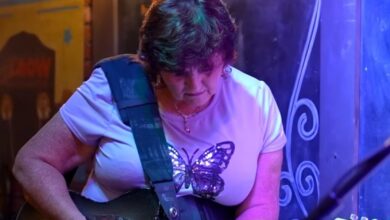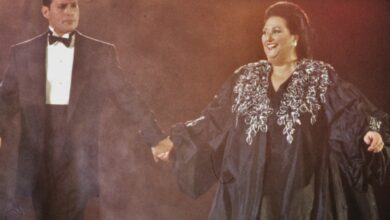Ann Wilson’s “Stairway to Heaven”: The Unforgettable Tribute That Moved Led Zeppelin to Tears
Ann Wilson’s breathtaking performance of “Stairway to Heaven” at the 2012 Kennedy Center Honors has entered rock history as a defining cultural moment—an instant of pure reverence that people continue to revisit with awe. Staged on December 2, 2012, and broadcast globally soon after, the performance celebrated Led Zeppelin’s monumental influence while showcasing, before an audience that included President Barack Obama, how timeless emotion can still pulse through a song written more than four decades earlier.
When Jimmy Page and Robert Plant composed “Stairway to Heaven” in 1971, they created an epic journey that rose from delicate acoustic beauty into a climactic storm of electric transcendence. Over the years, the song became a symbol of ambition, technical mastery, and spiritual yearning—an almost sacred ritual for guitarists everywhere. By 2012, however, few dared to touch it, fearing inevitable comparison to the original or accusations of overreach.
That was when Ann Wilson stepped forward—a voice whose roots and reverence for Zeppelin stretched back to her teenage years with her sister Nancy. The Wilson sisters had grown up studying Page’s intricate chord work and Plant’s soaring tone, performing Zeppelin covers in tiny clubs long before fame found them. Ann’s unmatched vocal power and instinctive understanding of Zeppelin’s essence made her the perfect artist to reinterpret “Stairway” with the respect and fire it demanded.
Behind the curtain, musical director Rob Mathes envisioned a version that would retain the original’s ascending spirit while introducing new emotional layers. The plan was simple but daring: Nancy would begin alone, armed with her 12-string acoustic guitar, her tone delicate and mournful. Ann would emerge later, as the song grew, transforming quiet reflection into celestial grandeur. To honor the band’s legacy, Jason Bonham—John Bonham’s son—would take the drums, his bowler hat evoking his father’s indelible image.
During rehearsals, the chemistry between the musicians was palpable. Ann reportedly delivered the song’s climactic note on her first take, leaving everyone speechless. Still, she insisted on perfecting every nuance, shaping words and phrasing until they carried both intimacy and grandeur. Producer Don Was later said it was like witnessing a sculptor reveal a hidden statue—each vowel, each breath exposing the soul behind the legend.
On the night of the show, the John F. Kennedy Center Opera House glowed with anticipation. As Nancy began those unmistakable opening chords, the hall seemed to hold its breath. Ann waited offstage, a shadow preparing to step into light. When she finally appeared—clad in black, commanding yet calm—her presence sent a ripple through the audience. Every line she sang balanced delicacy with power, drawing history and emotion into a single moment.
Midway through the song, a gospel choir appeared behind the musicians, transforming the atmosphere into something almost celestial. Their harmonies lifted the performance into a spiritual experience that united the audience in shared wonder. Jason Bonham played with reverence and precision, each strike of the drum echoing his father’s legacy. During the guitar solo, he looked upward for a fleeting second, a gesture that spoke more than words could ever convey.
As the choir softly repeated “And as we wind on down the road,” the cameras turned toward the balcony. Robert Plant’s eyes were glistening, Jimmy Page’s expression locked somewhere between disbelief and pride, while John Paul Jones smiled knowingly—three men bound by decades of memory, witnessing their creation reborn through another artist’s heart. The moment radiated connection, the kind only shared between those who once built something immortal.
Then came the final line—“And she’s buying a stairway to heaven”—delivered with such precision and grace that time seemed to pause. The note lingered in the air, vibrating through every soul in the room. As the music faded, Robert Plant brushed away tears, visibly moved. The audience rose in thunderous applause, recognizing that they had just witnessed something that transcended performance—it was communion through sound.
After the broadcast aired, the performance spread like wildfire across the internet. Millions watched within days, and the number kept climbing—four million, ten, fifty. Viewers were stunned by the emotional balance Ann struck, blending authenticity with reverence. Critics praised her restraint, admiring how she avoided imitation and instead offered her own heartfelt interpretation. The Wilsons later released the version digitally, donating proceeds to arts education, extending the gift beyond the stage.
Robert Plant later called the performance “magnificent,” admitting it filled him with joy and pride. That single remark silenced any lingering skepticism about whether “Stairway to Heaven” should ever be performed again. If the song were scripture, Ann Wilson had just delivered its most sacred sermon—one filled with fire, grace, and divine timing.
For Ann, that night ignited a new creative era. Younger audiences began flocking to her shows, eager to see the voice that moved rock’s greatest legends to tears. She occasionally revisited “Stairway” during her tours, treating it with the care of a rare relic. Each time she sang it, the emotional echo of that Kennedy Center night returned, as if the walls themselves remembered the sound.
The performance also reignited broader conversations about women’s roles in classic rock’s legacy. Ann’s fearless command of one of rock’s most revered compositions dismantled long-standing stereotypes about who could embody power on stage. Musicians and fans alike dissected her technique—the breath control, the phrasing, the phrasing precision—while guitarists worldwide traded insights on Nancy’s nuanced approach to the acoustic arrangement.
Beyond its technical brilliance, the Kennedy Center performance redefined “Stairway to Heaven” itself. By intertwining folk introspection, rock grandeur, and gospel transcendence, it shifted the song from a private odyssey into a collective prayer. Future covers, no matter the genre or instrument, would inevitably draw inspiration from the Wilsons’ interpretation—a moment when the song found new wings without losing its soul.
Years later, the clip continues to find new life online, resurfacing across social platforms as people rediscover its emotional power. It plays at weddings, memorials, and quiet nights among friends who simply want to feel something real. Each viewing revives the same sequence—anticipation, ascent, release, and shared silence—the timeless rhythm of human awe.
Ultimately, Ann Wilson’s “Stairway to Heaven” endures because it captures something eternal: the meeting point between reverence and reinvention. In a single breathtaking performance, Ann, Nancy, Jason, and the choir built a bridge across generations, showing that great music doesn’t fade—it evolves. Their rendition didn’t just honor Led Zeppelin’s masterpiece; it reminded the world that the stairway still rises, waiting for those brave enough to climb.





